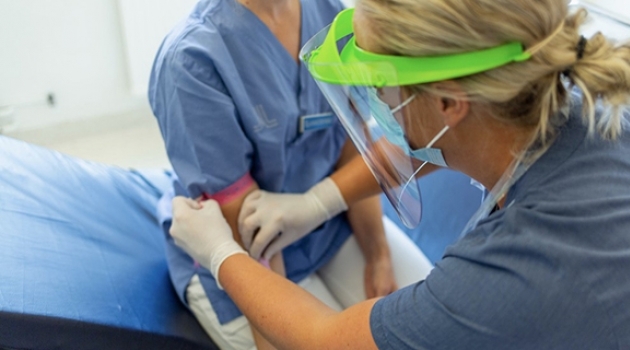Interdisciplinary collaboration provides new answers about immunity after Covid-19
Only weeks after the coronavirus reached Sweden, blood samples were taken from more than 2,000 employees at Danderyd Hospital. Today, a selection of the country's leading researchers collaborate with this unique material within the COMMUNITY study to extract new knowledge needed to fight covid-19.
How long are we protected by antibodies after a covid-19 infection? And what will immunity look like over time? In a current collaboration, leading research environments at three Swedish universities and Danderyd Hospital seek answers to some of the most crucial questions surrounding the ongoing pandemic.
“In the spring of 2020, SciLifeLab announced a SEK 62 million call for research on covid-19. During five intense days, we received approximately 300 applications from all over Sweden and granted 67. This magnitude illustrates the great commitment of the research community, but also SciLifeLab's important role as scientific coordinator. With our overall perspective, we were able to bring together new constellations of researchers, and the group surrounding the COMMUNITY cohort is an extraordinary example of how far we can reach in limited time when researchers collaborate in the right setting,” says Mia Phillipson, professor at Uppsala University and co-Director at SciLifeLab.
Samples from employees at the hospital
Work on the COMMUNITY cohort began in April when Charlotte Thålin, doctor and principal researcher, began collecting blood samples from 2,149 employees at Danderyd Hospital. A strategically important group that move close to covid patients, via their workplace are available for further samplings and in their profession are well acquainted with the necessities of contributing to scientific challenges.
“Already minutes after we opened the registration, all places were filled, and the participants' outstanding commitment remains: They continuously communicate their state of health via an app, in January we will perform a third sampling, and basically everyone follows. It gives us a continuous cohort that is easy to study, and that we now also gather the interdisciplinary excellence and manpower required to analyse the material in full will pave the way for results that no individual environment can deliver,” states Charlotte Thålin.
Multiplex test of antibodies
With applicable proteins and a multiplex test, developed by Sophia Hober and Peter Nilsson, professors at KTH, several relevant observations have already been made. For example, the occurrence of antibodies is almost three times higher among employees who have cared for covid patients than in the administration. Similarly, 87 percent of those who carry antibodies have only experienced mild or no symptoms. In another study that began in October, Sara Mangsbo, research leader in immuno-oncology at Uppsala University, analyses how long our immune system provides protection after a covid-19 infection. In January, she will begin follow-up studies:
“When we are infected, our body activates T-cells that can kill virus-infected cells, direct the remaining immune system and generate lasting protection against future infections. The memory T-cells created against the virus can quickly be activated upon re-infection. By testing the blood samples in the COMMUNITY cohort against synthetic pieces of the coronavirus, we can measure how long the memory cells remain active and study the immune response over time. Together with Pierre Dönnes at SciCross, we have developed synthetic peptides that can identify SARS-CoV-2 specific T-cell responses for the project, and if we screen all 2,149 samples, it will make an almost unique T-cell study in scope,” says Sara Mangsbo.
Collaboration absolutely crucial
The form of interdisciplinary collaboration that surrounds the COMMUNITY cohort is becoming increasingly important in the world of research. Several Swedish and international calls require collaboration across scientific and organisational boundaries. Lars Hultman, CEO of the Swedish Foundation for Strategic Research, regards collaboration to be absolutely crucial for sustainable societal development. And in the bill recently presented by the Swedish government for research policy 2021–2024, it is proposed that SciLifeLab shall be allocated SEK 130 million in order to develop a Center for Pandemic Preparedness.
“During the pandemic, we have shown that SciLifeLab is able to deliver under pressure, and the content of the research bill is for me a confirmation that the structure we add is necessary,” says Mia Phillipson. “Next, we will continue to see the results of the projects we granted funding in the spring of 2020. We have also, with funding from KAW, launched a new call focusing on covid-19. In the long run, we must take the time to gather everyone's experiences from this period to be better equipped in the future, but we can already state how far the research community can reach with collaboration and team science.”
Magnus Alsne
Facts
- The COMMUNITY cohort comprises 2,149 employees at Danderyd hospital.
- All participants submit blood samples at four-month intervals for studies focusing on covid-19.
- The COMMUNITY study, with a focus on the material, comprises:
- Principal researcher:
- Charlotte Thålin, with dr, KI, specialist doctor Danderyds hospital
- Project leader at each university:
- Sophia Hober, professor, KTH
- Peter Nilsson, Professor, KTH
- Mia Phillipson, professor, Uppsala University, co-director, SciLifeLab
- Sara Mangsbo, associate professor and assistant. senior lecturer, Uppsala University
- and several research teams in collaboration with the responsible researcher and project manager.
Find out more
- Visit online Research in immune-oncology at Uppsala University
- Visit online SciLifeLab
- Research spotlight: The corona virus

